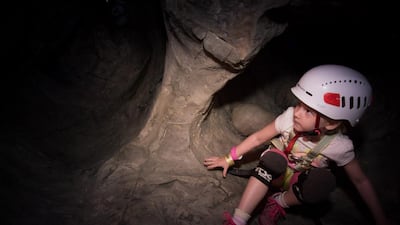Cave tunnels to clamber through? Check. Rocky pinnacles to scale? Check. Boulders and dinosaur bones to climb up? Check. No, this isn’t the checklist of requirements on a wild adventure holiday in the mountains, but the range of activities on offer at the latest Adventure HQ, which has just opened in Abu Dhabi’s Yas Mall.
Since the company was founded in Dubai six years ago, it has been filling the country’s malls with the kind of adventure sports that used to be limited to parks and mountain peaks. As well as offering new ways to scale dizzy heights, Adventure HQ’s six other branches in Abu Dhabi and Dubai also offer skate parks, a bike pump track and a trampoline park.
The latest Adventure HQ is spread over two floors covering 20,000 square feet, which includes an 8,000-square-foot store where you can find more than 7,000 products for outdoor pursuits.
The standout activity in its new Adventure Zone is the network of weaving, cave-like tunnels to crawl through while wearing authentic mining helmets. Indoor caving is unique in the Middle East and the company claims this is only the second of its kind in the world.
“The only other place you can try indoor caving is in Ireland,” says Adventure HQ’s founding chief executive Sam Whittam. “The new Yas Mall caving experience is as lifelike as it can get, and there are lots of different routes you can do.”
Whittam says the cave tunnels offer the thrills, without the dangers, of being inside an actual cave tunnel. “The company that manufactures the cave tunnels and the climbing pinnacle use a glass-reinforced plastic, which they mould off actual rock climbing faces on limestone cliffs in Bulgaria,” he says.
Another new feature is that Adventure HQ is also inviting schools to bring children to use their adventure sports facilities during lesson times, as well as after school. The company, which is the region’s largest outdoor adventure and active-lifestyle retail specialist, has spent the past year developing an initiative to encourage schools to use their facilities for physics, chemistry and maths classes, as well as for PE lessons.
“We’ve got a couple of in-house school leaders from the UK, who have developed a programme in conjunction with some teachers,” says Whittam. “We put 104 different lesson plans together that all link back to learning objectives around whatever the schools are trying to get the kids to understand in their curriculums. This is a really great [programme] we can run for the schools, to get kids more active.”
Whittam practises what he preaches to the children who come to use Adventure HQ’s facilities – not only by trying out the new tunnelling experience for himself, which he says was “fun”, but also by living his own life outside work as an adventure.
“This weekend I’m doing the Ironman 70.3 challenge at Jumeirah Beach Park. I absolutely lead by example at Adventure HQ. You have to.”
Adventure HQ is already on the hunt for the next big idea.
“We are trawling the globe to come up with what’s next,” says Whittam. “We’ve been looking at an indoor mountain-bike park, a flying-fox kind of glider, all sorts of wild and wacky things. The world’s a crazy place when it comes to entertainment centres. But we want to do things that are different. We want to keep evolving and not stay static – we want to always keep giving people new and fresh options.”
• Minimum time for each activity at Adventure HQ in Yas Mall is 30 minutes (Dh60). Only for ages 4 and above
artslife@thenational.ae

